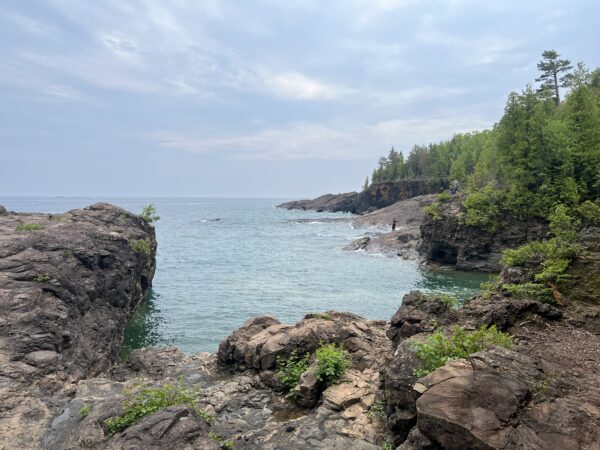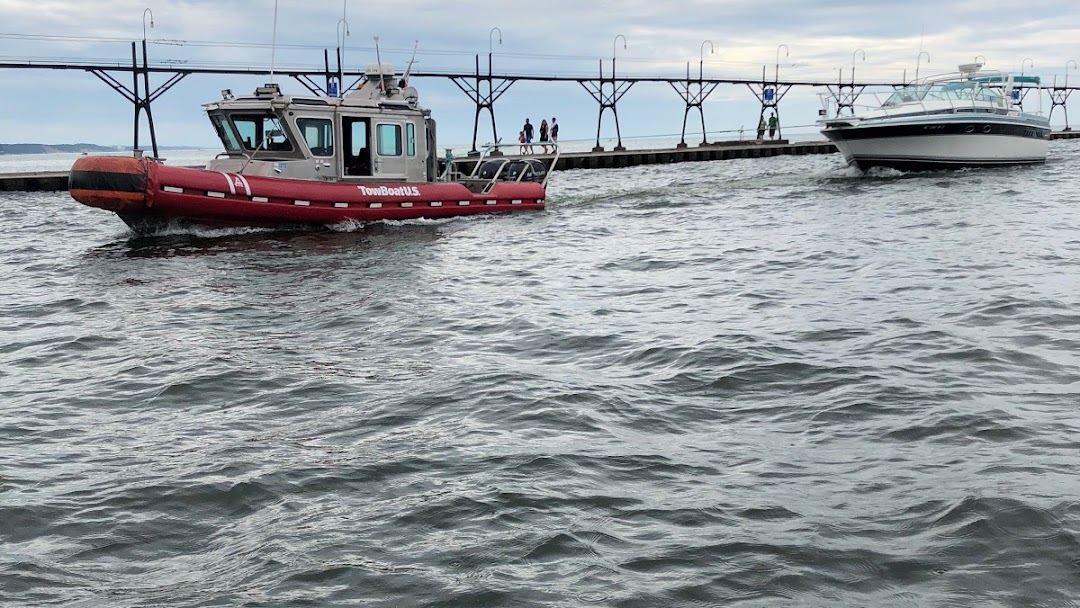
When the COVID-19 pandemic struck, millions of Americans suddenly found themselves out of work or working remotely, their recreational options severely limited with the closure of bars, eateries, gyms and countless public spaces.
So what better way to spend time with family while remaining socially distanced than buying a boat and hitting the water?
The result has been an increase in inexperienced boaters on the water.
“The dynamics of that has really changed in the last 18 months. We’ve noticed an enormous amount of new boaters in the industry, and there’s a lot of old boats out there that are probably $500 to $2,500, and people are buying them up and getting into a boat with little or no experience,” said Capt. Richard Lenardson, who operates Great Lakes Marine Services out of Bridgeman, Michigan.
He said it’s great to see more new faces piloting boats, but it causes a problem – especially when many of the boats likely aren’t even ready for the water, especially big water.
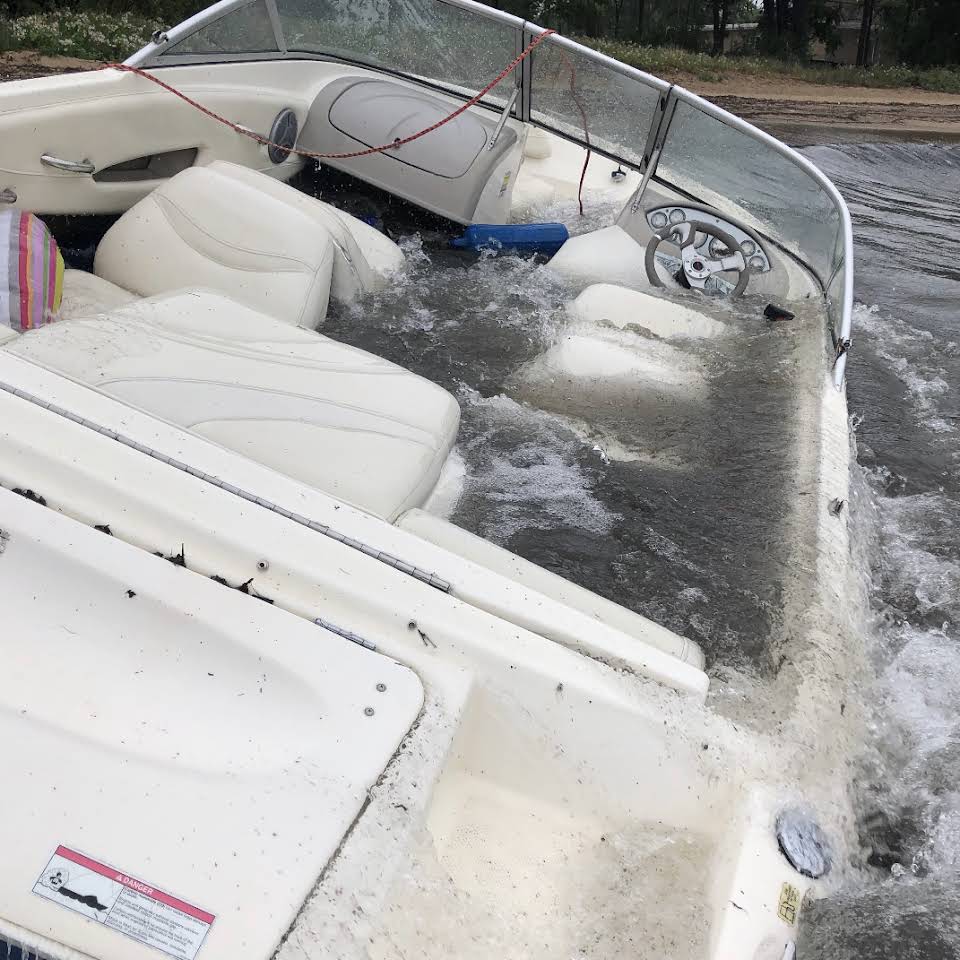
One of Great Lakes Marine Services’ Richard Lenardson’s customer’s boats. This was definitely a salvage operation. (Photo provided by Great Lakes Marine Services)
“Lake Michigan is definitely far more dangerous for people with no experience. Many don’t understand how quickly it can change,” Lenardson explained. “It can go from flat to 7, 8, 10 feet in a matter of a couple hours.”
Capt. Bill Leslie has been operating St. Clair Marine Salvage for two decades and said he, too, has noticed the influx of new boaters. Unfortunately for the boaters, many often find themselves on the radio or cell phone calling for assistance.
“Since the pandemic there has been a whole rash of new boaters on the lake,” he said. “Once they get bitten by a tow bill the first time, they’ll buy a TowboatUS membership and then they’re all good again. We’re kind of in a transition period, a year after the pandemic, because there’s so many new boaters. Just a lot of inexperienced people on the lake.”
Anglers’ and partiers’ main problems: fuel-outs and dead batteries
Leslie is referring to an annual membership boaters can purchase which covers the cost of most towing services offered by Great Lakes captains. It’s similar to a AAA membership and covers routine, non-emergency towing back to a nearby port, jump-starts, re-fueling and the like.
BoatUS, Boat Owners Association of the United States, is the nation’s largest recreational boating advocacy, services and safety group. It licenses operations like the ones Leslie and Lenardson run through their TowboatUS fleet. Currently TowboatUS has 43 port locations on the Great Lakes stretching from Clayton, New York, to Bayfield, Wisconsin.
For about $90 a year, boaters can get towing on the lakes for the routine problems. For a few bucks more, they can sign up for a roadside assistance program for those who trailer their vessels.
The Great Lakes states are one of the nation’s boating hot spots. Half the nation’s top 10 recreational boating states by numbers border the lakes Those states claim about 3.25 million recreational boat registrations. With the sheer number of people out on the lakes in boats, it’s inevitable that some of them will hit trouble.
“Probably our No. 1 call is some sort of a general engine or drive failure,” said Lenardson. “Next you’re going to run into fuel-outs and dead batteries.”
According to Lenardson, many dispatches are predictable. Like the dead batteries that come with perch season in the southern lakes when anglers sit anchored for hours with engines cut. Or in Traverse City, Torch Lake or at the Playpen in Chicago where folks party for hours rafted off in sprawling flotillas. He said the big parties always come with props fouled by anchor lines.
In these cases, BoatUS tow captains provide free towing to those with a membership. For the rest, it’s an out-of-pocket expense, far from inexpensive.
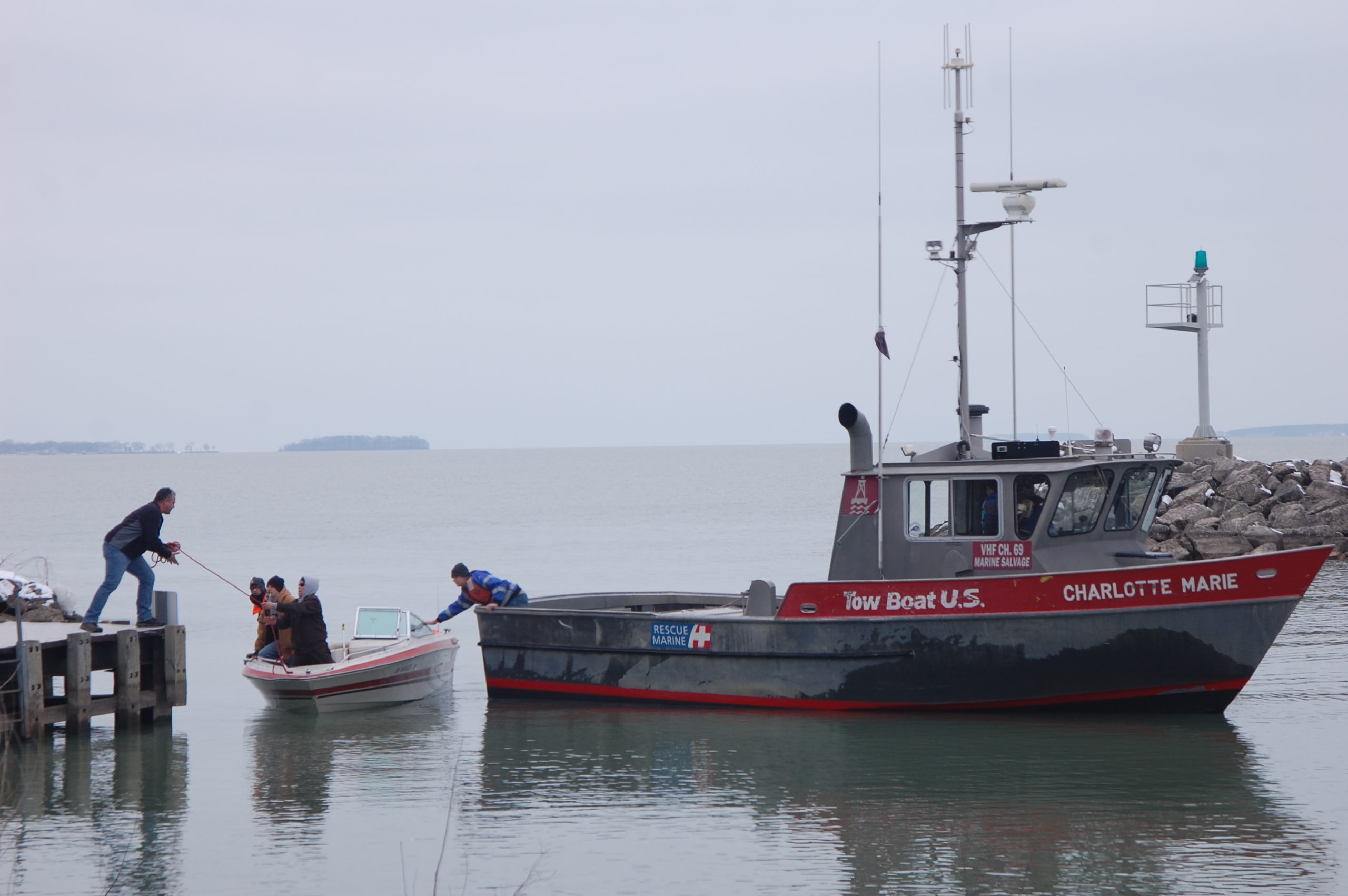
Marblehead-based Rescue Marine delivers a boat to the dock at the Mazurik ramp. (Photo by James Proffitt)
Sticker shock for the uninsured
Boaters who need assistance on the water and have not acquired a tow membership often suffer sticker shock when they learn the cost.
GLMS charges what’s considered the going rate for towing, about $300 an hour for daylight towing and about $400 an hour for night towing. The clock starts ticking when the towboat leaves its home port and stops when it ties off back at the dock. According to BoatUS, the average cost for tows is about $790. With towing memberships that cost is zero.
Finding boaters in online forums venting about costs of assistance they received is easy, but operators say the cost is justified.
“It’s the fuel, the captain’s pay, the maintenance on the boats and it’s the seasonality,” Leslie said. “We have to make enough in six months to last 12 months. But the maintenance is really high and the cost of parts is phenomenal. The spare parts you have to have, sitting around 24 hours waiting for someone to break down or call, none of it’s cheap.”
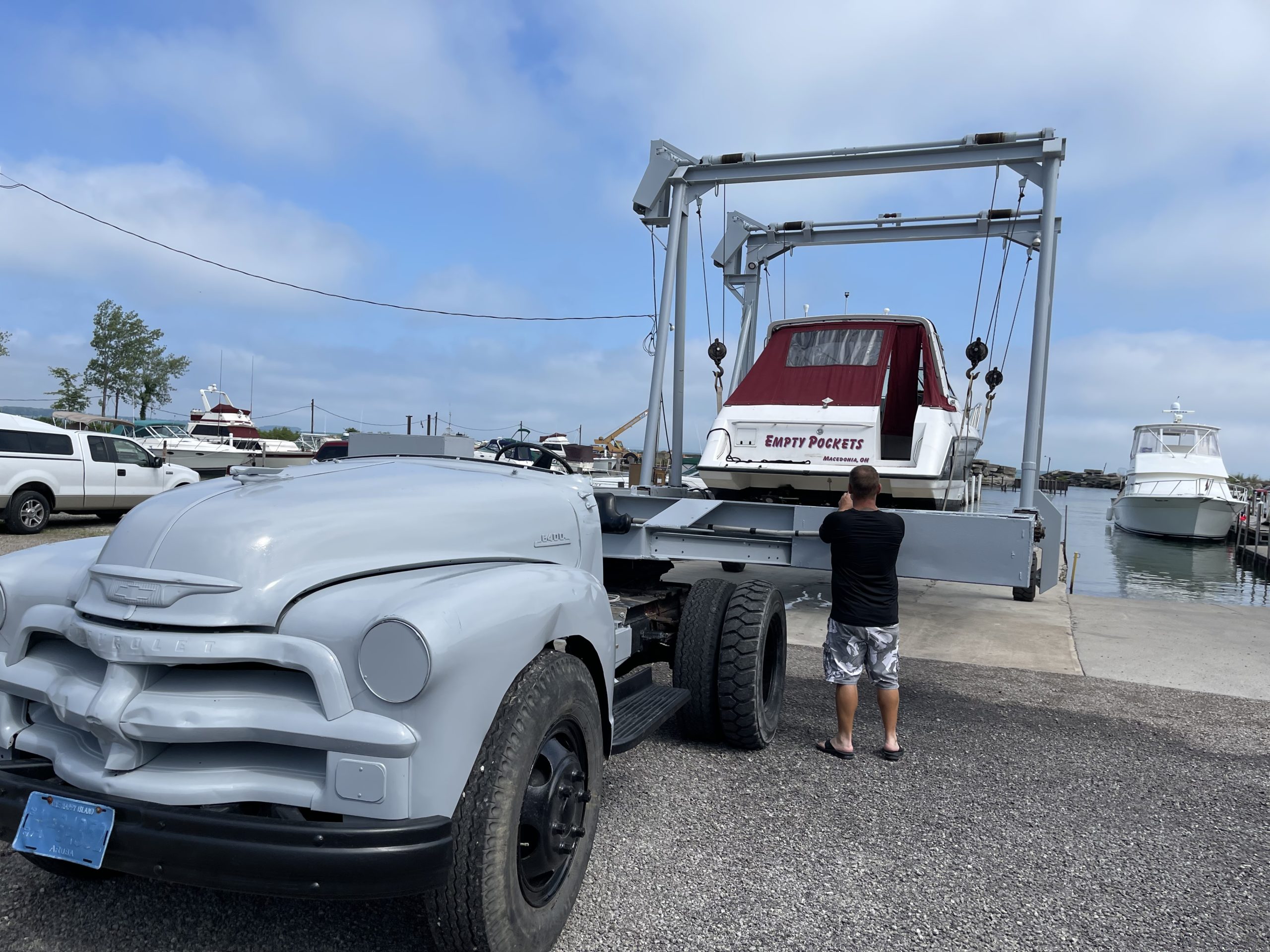
Tom Fackler snaps a photo of his boat, just towed and hoisted by Marblehead-based Rescue Marine. Fackler was at Put-in-Bay when his Empty Pockets began taking on water. (Photo by James Proffitt)
In late July, Tom Fackler and a friend encountered trouble near South Bass Island in Fackler’s 30-foot cabin cruiser.
“We must have hit a rock last night,” he said. “We have two motors, so we had one motor down and we went ahead and rented a dock for the night and enjoyed the island. When I jumped out of bed in the morning the water was a little over my calf and we started bailing.”
Fackler said it was pre-dawn and they had no battery power, no working bilge pump. They called for service. A TowboatUS vessel arrived in about an hour. The captain outfitted Fackler with a pump and power, pumping water as they were towed to a port in Marblehead, Ohio, for repairs.
“Actually this is the first time we’ve taken this boat out, so I’m learning the waters,” Fackler said.
While Fackler had purchased a TowboatUS towing membership, it likely won’t help cover the cost of his island mis-adventure. Towing memberships cover routine mechanical breakdowns and soft un-groundings, meaning easy, simple assistance. When additional lines, towboats or equipment is used it becomes a salvage operation.
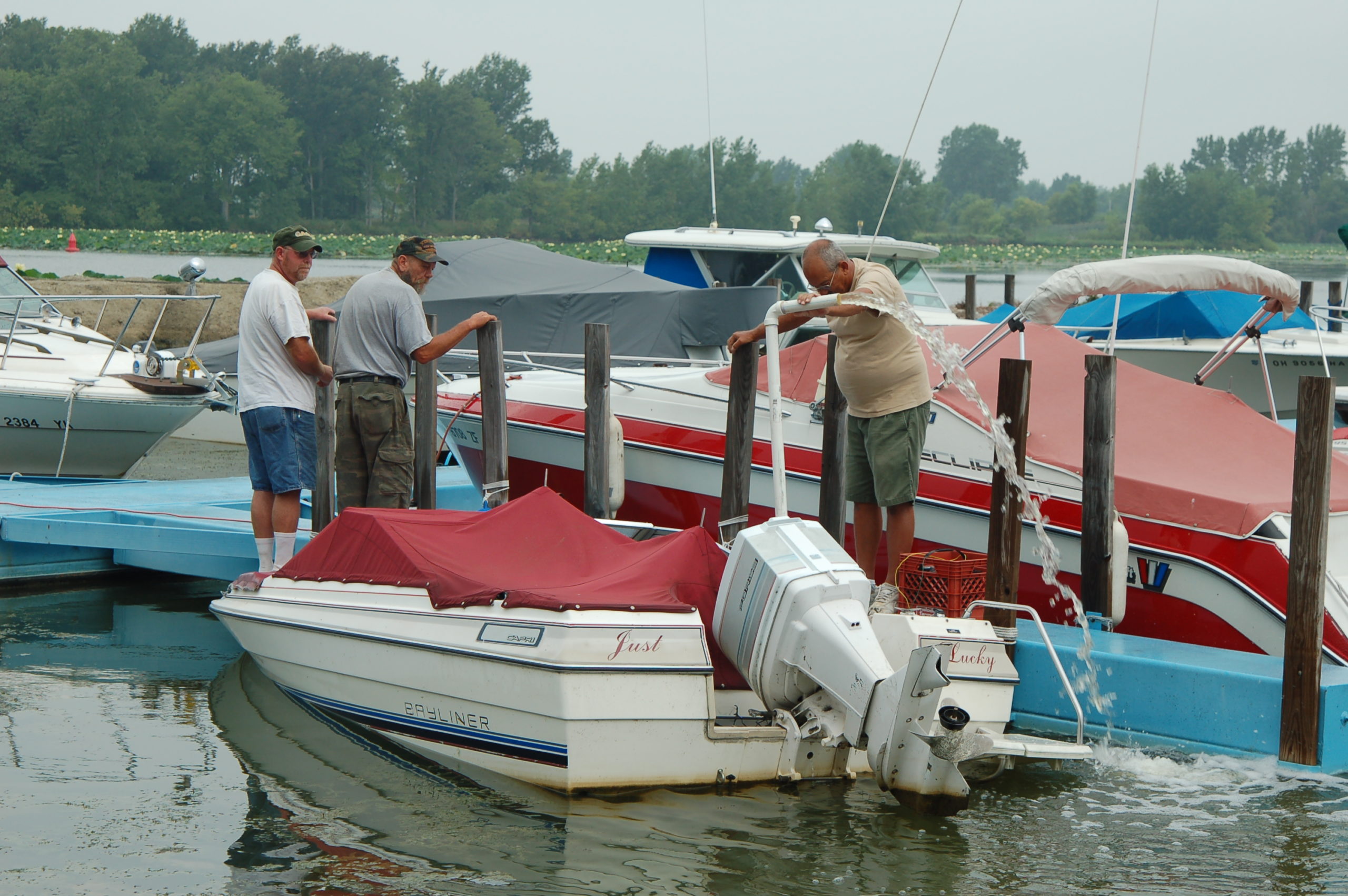
These Lake Erie boaters narrowly escape a salvage bill due to the quick action of a marina manager. (Photo by James Proffitt)
Salvage vs. tow
There can be a fine line between a salvage operation and a tow, and it can be an expensive one.
“Basically, if it’s one towboat, one towline, we call it soft un-grounding,” explained Scott Croft, vice president of public affairs for BoatUS. “Technically, anytime you lend assistance to a boat that’s in peril, it’s called salvage. You run your boat up on shore 15 feet on a bluff, that’s not soft ungrounding. Any time you have divers, a second boat, you can be pretty much assured it will be a salvage covered by your insurance policy, and if you don’t have insurance it’s going to be covered out-of-pocket.”
Pumping water from a vessel while being towed, like in Fackler’s case, is considered salvage. Pulling a sailboat off the rocks near Cedar Point a few years ago resulted in a salvage invoice for the owner of the 25-foot O’Day sailboat. He and his crew sailed back into Sandusky Bay from Lake Erie, ending up on the rocks. With furled sails and engine power, they were still locked aground by a steady west wind.
One phone call had the U.S. Coast Guard there in just a few minutes. A second call by the USCG had TowboatUS there shortly. Within an hour the sailboat was hanging in a hoist at a nearby marina with no hull damage.
The bill, because it was considered salvage: $200 per foot on the boat, which came to $5,000. The tow company settled for $2,500 – and because the sailboat had no trailer, a boat transporter picked it up. In the end, the boat was kept as a portion of the transporter’s fee.
The sailor was flummoxed as to why the USCG failed to render assistance, complaining they were just a few yards away.
Don’t count on the USCG for routine assistance
“The government just doesn’t compete with commercial interests,” said Karl Willis, search and rescue specialist for the 9th USCG District. “That’s what those salvers do, and they make a living at it. We’ll respond to any search and rescue, and any life, limb or property situations.”
As an example, Willis offered a scenario where a USCG vessel pulls a hard aground boat free and the boat sinks. Much better to have a commercial towboat there equipped for such situations, he said.
“If a guy is on the rocks and taking a beating, we may throw a line and take him off just to stop a worsening situation, but those circumstances are extremely rare, Willis said. “The sailors on the rocks at Cedar Point appeared to be safe and they weren’t going anywhere while awaiting a towboat.”
Had one of the sailors suffered a medical emergency, that would have changed the trajectory, according to Willis. But in non-distress situations, he said, the USCG’s main priority is acquiring the needed assistance from commercial operators or even a good Samaritan boater. Whenever the USCG does become involved, Willis said, there is no cost. As a taxpayer-funded operation, there is never a charge for services rendered.
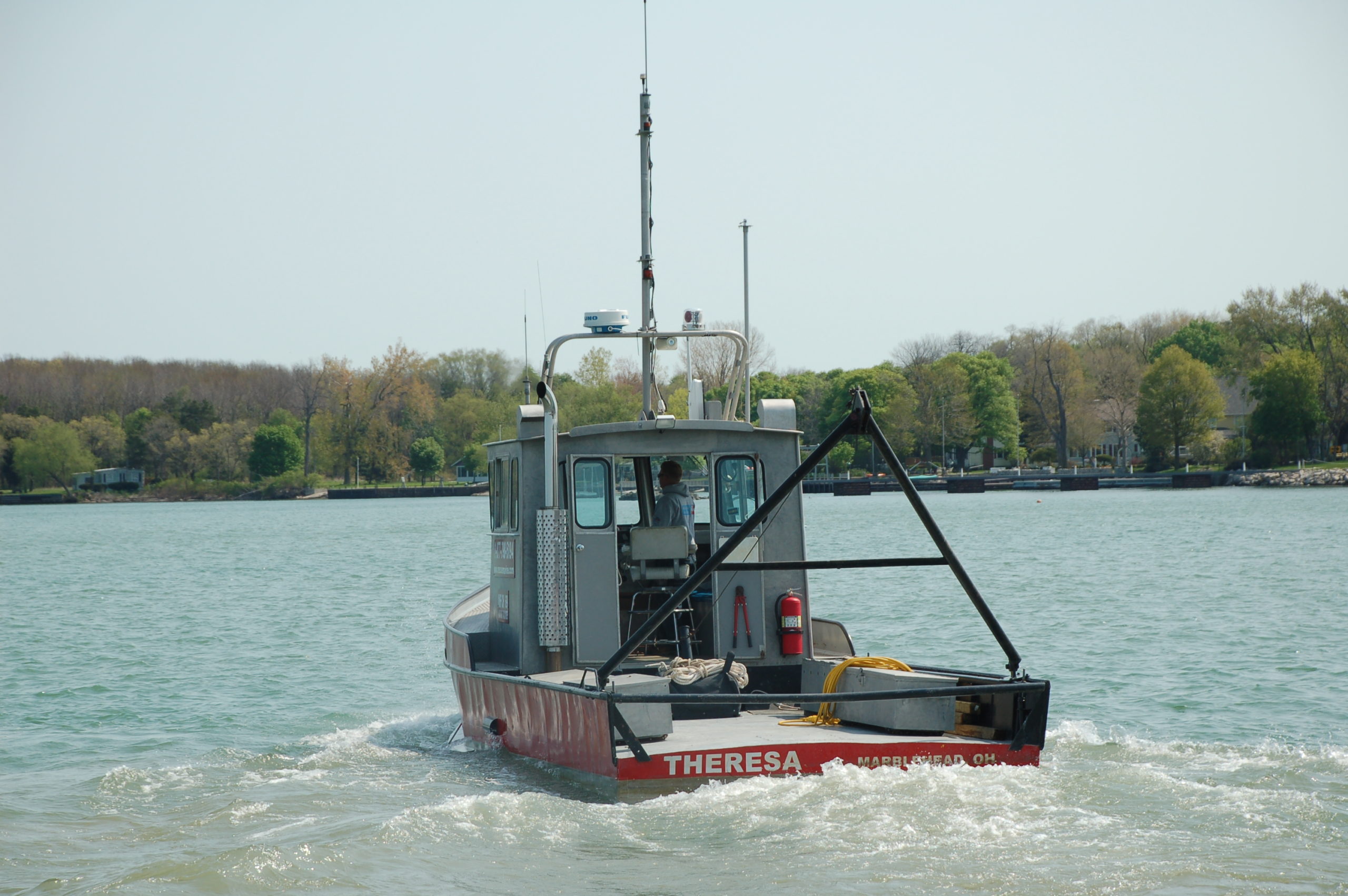
One of Rescue Marine’s towboats on the water near Marblehead, Ohio. (Photo by James Proffitt)
Terrible, amusing sights on the water
“I’d say most of the preventable accidents I see are alcohol-driven,” Lenardson said. “So many people are drinking and driving boats, and that’s where most of my fatalities come from, my bad accidents. I’ve seen people get towed in so drunk they couldn’t figure out how to start their boat, which was probably a blessing.”
Over the years, towing and salvage captains have seen it all.
“We’ve had anything from a baby crowning and ready to deliver when we hit the sea wall and an ambulance took her from us,” Lenardson said, “and we’ve run up on people where their boats went in the water and people were literally swimming and probably wouldn’t have lasted 15 minutes longer if we hadn’t gotten there. We picked a deer up swimming in the middle of nowhere. I don’t know if he would have made it back to shore or not.”
Leslie said low water levels on Lake St. Clair have caused many people to run aground or end up plowing through weeds and getting stuck, even spending the night on boats.
“And sometimes they don’t know where they are, so you’re trying to find them and it’s a challenge because they can’t explain or figure out where they’re at, especially without GPS,” he said.
According to Lenardson, even state-of-the-art electronics can’t help some boaters.
“Silliness-wise, you’d be surprised how many people in the dark follow their GPS and get a way-point, they go the way the crow flies but that GPS doesn’t know there’s a pier in the way,” he said. “We get people on the rocks or on the pier all the time.”
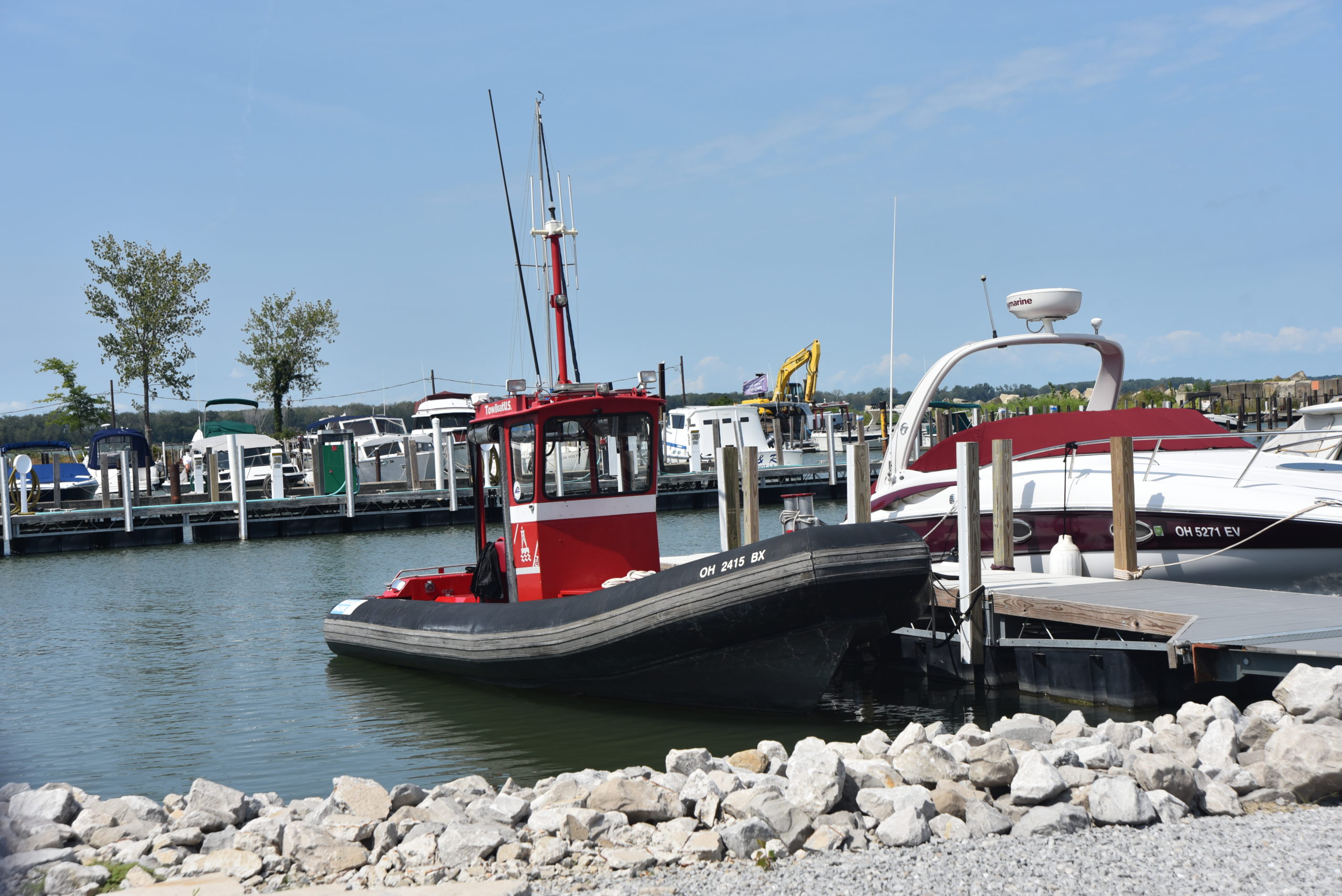
Smaller rigid-hull inflatables are a staple of towing fleets. (Photo by James Proffitt)
Captains’ duties include saving lives
Earlier this summer, one of Leslie’s captains located a man in the middle of the night more than a mile offshore after the man’s 14-foot boat sank when returning from the Jobbie Nooner party at Gull Island. The 22-year-old Lansing man was saved after he’d been in the water nearly six hours.
SCMS captain Lance Pannebecker was towing a boat when he heard screaming and shut down his engine. He used flood lights to search for the man in the darkness, eventually locating the man. The boater’s friend, a 19-year-old man, died after they became separated swimming to shore.
Showers and thunderstorms were prevalent that day with waves were reported 4 to 5 feet.
“I want people to know that on Lake St. Clair the weather and waves can change rapidly. It happens to me in my own boat,” Pannebecker said. “You really should be familiar with the water you’re on.”
Leslie said that during the 2020 event, in a single day his captains received 92 requests for service.
“We had a lot of intoxication. There were deaths that day,” he said. “A lot of boats sinking – just about anything you could think of that day.”
Willis’ advice to all boaters is to file a float plan, keep the appropriate lifejackets aboard (and wear them) and keep a VHF marine radio handy.
Catch more news on Great Lakes Now:
Boating on a Budget: Get off land and onto the Great Lakes
Legacy Boats on Lake Erie: Wooden boats once ruled the waters of the Great Lakes
Boat Life: The ups and downs of life as a mail boat captain
API key not valid. Please pass a valid API key.Featured image: One of Great Lakes Marine Services’ Richard Lenardson’s vessels on a simple tow. (Photo provided by Great Lakes Marine Services)
2 Comments
-
Great Post. I really appreciate it. Hope it will be helpful for others who search for the best resource about it. Thank you so much for the helpful post.
-
Managing a boat is all about striking the perfect balance between the thrill of adventure and the responsibility of maintenance.



